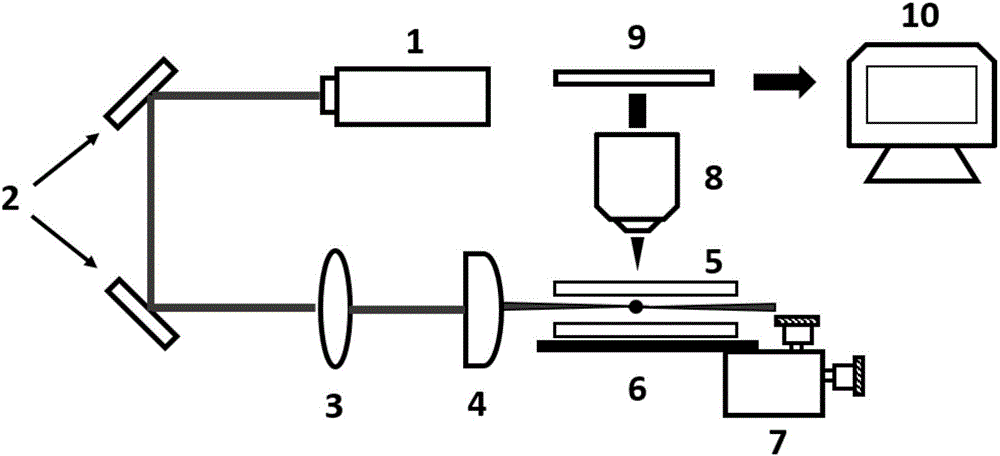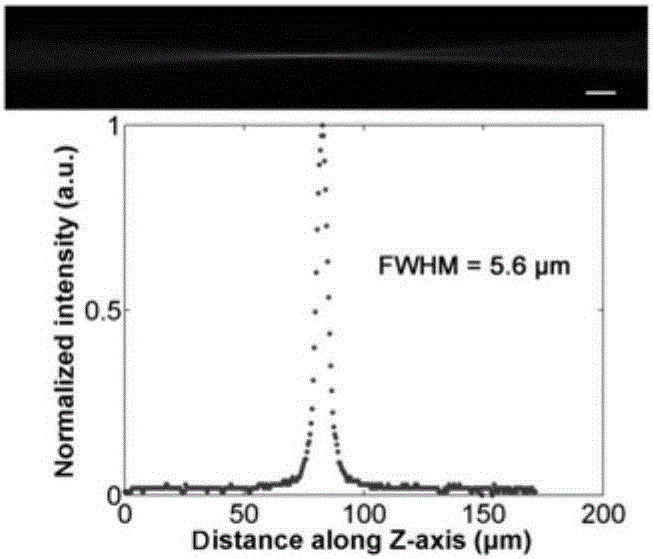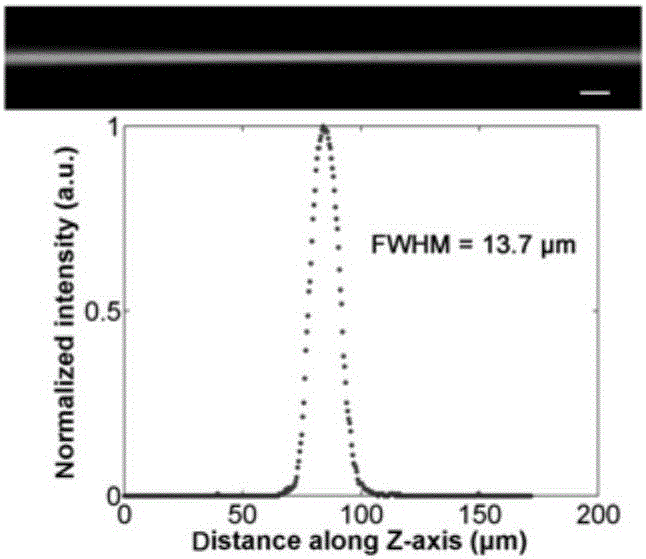Label-free cell detection device and method based on light sheet illumination
A detection device and detection method technology, applied in measurement devices, biochemical cleaning devices, biochemical equipment and methods, etc., can solve the problems of strong subjectivity of manual reading, uneven reporter genes, complex process steps, etc. The effect of easy control of sheet thickness and position, efficient energy utilization, and low cost
- Summary
- Abstract
- Description
- Claims
- Application Information
AI Technical Summary
Problems solved by technology
Method used
Image
Examples
Embodiment 1
[0053] A label-free cell detection device and method based on light sheet illumination is used to realize uniform illumination light sheets with different thicknesses. In light scattering imaging, in order to reduce the background noise in the imaging process and at the same time ensure that the sample to be tested is uniformly illuminated, the present invention provides different thicknesses of light sheet excitation for samples of different sizes and scales, and controls the thickness of the light sheet in a targeted manner. , to limit the excitation area and avoid interference from scattered light from other samples. A light sheet of required thickness is produced by controlling the beam expansion factor of the beam and the focal length of the cylindrical lens. In this example, light sheets with different thicknesses are realized by converting cylindrical lenses with different focal lengths. The different thicknesses are visualized through a rhodamine solution and the ligh...
Embodiment 2
[0060] In order to verify the sensitivity and accuracy of the present invention for particle size identification at the micron level, polystyrene standard microspheres were used for experimental verification and device calibration. In the present invention, standard microspheres with particle diameters of 3.87 μm and 4.19 μm are selected as imaging samples, and their microscopic images and two-dimensional scattering diagrams are obtained, and the experimental results are compared with the Mie simulation results by FFT analysis. The selected microscopic objective lens in the present invention is a 20 times objective lens with a numerical aperture of 0.4, and its corresponding detectable angle range is 72.5°-107.5°, so in the Mie simulation, the scattering polar angle and azimuth angle values are in this range . In this example, the thickness of the optical sheet is adjusted to be about 13 μm.
[0061] Specific steps:
[0062] (1) Take an appropriate amount of polystyrene mi...
Embodiment 3
[0071] Cell identification and automatic classification of human fibroblast senescent cells and normal cells are performed using a label-free cell detection device and method based on light sheet illumination. In this example, the thickness of the light sheet is adjusted to be about 50 μm. Cell morphology images and two-dimensional light scattering patterns were collected from human fibroblast senescent cells and normal cells induced by hydrogen peroxide aging, and 55 experimental results were randomly collected for each type. The feature parameters of the obtained 110 light scattering images were extracted, and the support vector machine (SVM) algorithm was input as the feature parameters to automatically classify the two types of cells.
[0072] Implementation:
[0073](1) Prepare human fibroblast senescent cells and normal cells treated with hydrogen peroxide, configure cell suspension with PBS buffer, import the sample into the microchamber, control the displacement stage...
PUM
| Property | Measurement | Unit |
|---|---|---|
| thickness | aaaaa | aaaaa |
| thickness | aaaaa | aaaaa |
Abstract
Description
Claims
Application Information
 Login to View More
Login to View More - R&D
- Intellectual Property
- Life Sciences
- Materials
- Tech Scout
- Unparalleled Data Quality
- Higher Quality Content
- 60% Fewer Hallucinations
Browse by: Latest US Patents, China's latest patents, Technical Efficacy Thesaurus, Application Domain, Technology Topic, Popular Technical Reports.
© 2025 PatSnap. All rights reserved.Legal|Privacy policy|Modern Slavery Act Transparency Statement|Sitemap|About US| Contact US: help@patsnap.com



